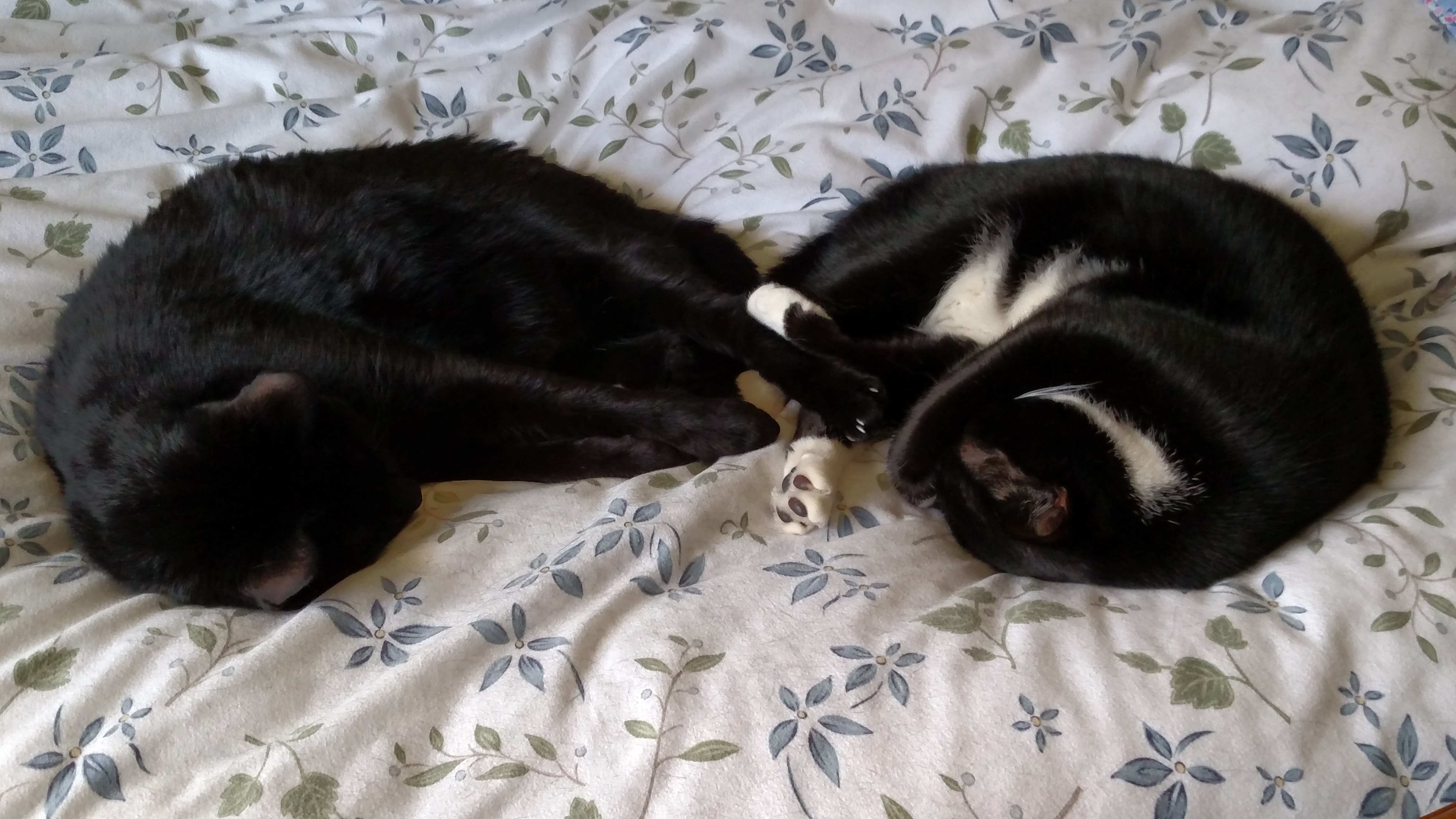
Hello Monday. We’re still in quarantine time. A new world, one which I never fathomed. When I have extra time on my hands, my mind wanders and wonders. This morning what came to mind was Erik Erikson’s idea (I’m simplifying here, so don’t get your knickers in a twist) that early experiences have a profound influence on later life. He noted two distinct types of people; those who had positive early experiences and came to believe the world was basically good, and those who had negative early experiences and came to believe the world was basically bad.
While I don’t agree with everything Erikson wrote, I believe there is validity to this. Interestingly, I see it played out in my cats (yes, I told you I had a lot of free time right now). We have two cats, Earl Scruggs and Leon Russell (and now you know my musical taste is eclectic).
We adopted Leon from our local humane society. We went there in search of a dog, but there were none that sparked our interest. On a whim, I said, “Let’s just look at the cats.” We’d lost one of our cats about six months earlier. Spike was a special cat and I hesitated to get another, but Birdie cat was bereft. She wandered around the house howling forlornly. So, we looked. My eyes were caught by a short-haired tuxedo cat who was curled up in his bed in his shelter cage. Spike was a tuxedo cat and I was fond of the color pattern. I asked to see him. The shelter volunteer brought Gabriel (his shelter name) into the cat introduction room, where he immediately curled up in my lap and started purring. We found out he was relinquished by his previous owner. Whoever owned him had treated him well. He is sure of himself, calm, loving, mellow. He is a cat who likes to be carried, held and loved. It appears his early life experiences were good.
Earl was a feral kitten. His mother, Tuxy, had been a feral kitten as well. We’d managed to catch Tuxy’s mom, Stubby and get her spayed after she had Tuxy. We were unable to catch Tuxy, but we fed her and provided an insulated doghouse on our patio. She was friendly enough that she would come up to the screen door and rub her head on it, and she wouldn’t run when we put food out, but we couldn’t catch her. Soon, she was pregnant. She gave birth to six kittens in the doghouse on our patio. We started touching the kittens early on, when she left them, so they would get used to being handled. But, they were still feral. Once they are about three weeks old, she began moving them from place to place to keep the kittens safe; sometimes they would be on the patio, sometimes they would be gone. One day I watched her move the kittens to another location; all but one, an all-black short haired kitten. I left him out there, figuring she would come back, but she didn’t. After a few hours, I realized she might not come back for this kitten, so I brought him inside and Soni called our local cat rescue, which came and got Earl and gave us instructions for how to get the rest of the kittens and Tuxy. Well, the little black kitten sat curled up on my neck for two hours before the cat rescuer came, so I knew he was going to come back to us when he was old enough. Within a few days we were able to catch the rest of the kittens and get them to the cat rescue and shortly after that we caught Tuxy who was spayed and released. All but one of the kittens survived.
The black kitten returned to us when he was about three months old. Now known as Earl, he is loving to us, but tentative around people he doesn’t know. He is easily startled. His early life was uncertain.
The difference between the two cats is obvious when it comes to breakfast time. The cats are free-fed dry food, but they also get a little wet food every morning, around 7:30. At about 6:30 Earl starts meowing. He runs back and forth between the kitchen and wherever we are, letting us know he needs to be fed. Leon, on the other hand is usually sleeping, or lying somewhere, chilling. When I get the cat food can out, Earl starts meowing loudly. He gets on his hind legs and reaches up toward the counter, trying to get the food. Leon is still asleep. As I lower his bowl to the floor, Earl is trying to grab it with his paws. As soon as it hits the ground, he eats it as fast as he can, making sure every bit is gone. After I put his bowl on the floor, Leon lifts his head and saunters to his bowl. He eats what he wants, and then walks off. Leon never worries that there isn’t enough, he never doubts his good is coming. Earl, on the other hand is always worried that his good either isn’t coming, or if it comes, he worries it will be taken away.
I love both cats and I wouldn’t want either of them to change. They are who they are. Today, can you be authentically who you are and allow others to be who they are? Can you give others grace knowing that who they are today is a result of all their life experiences?











